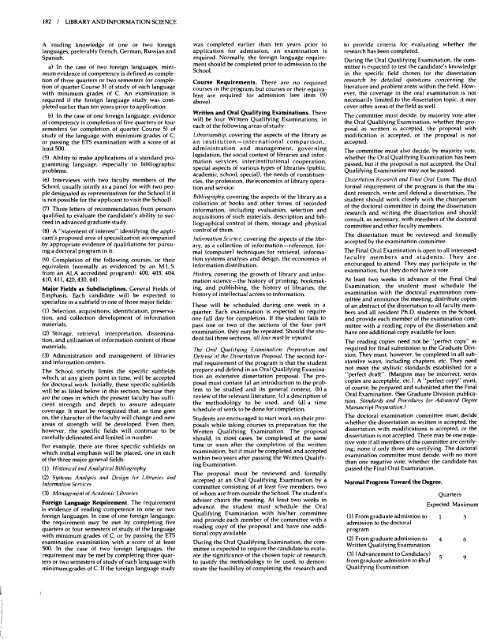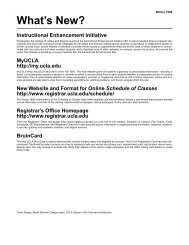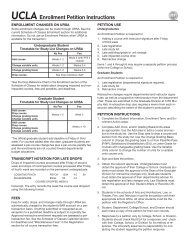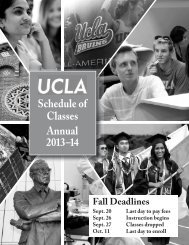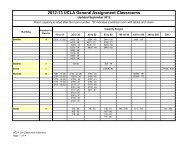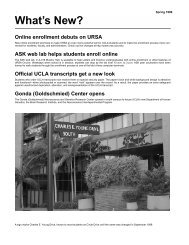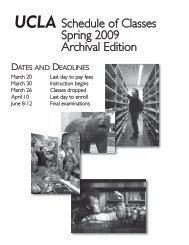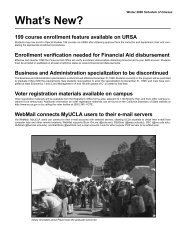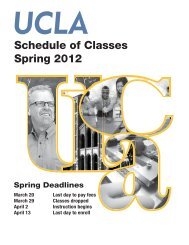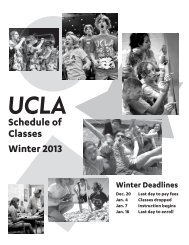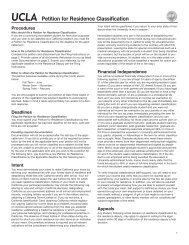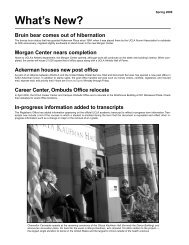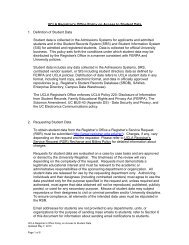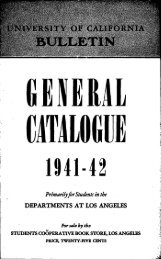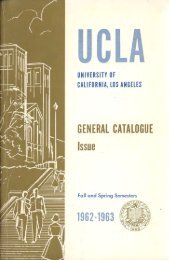UCLA Graduate Catalog 1980-81 - Registrar - UCLA
UCLA Graduate Catalog 1980-81 - Registrar - UCLA
UCLA Graduate Catalog 1980-81 - Registrar - UCLA
You also want an ePaper? Increase the reach of your titles
YUMPU automatically turns print PDFs into web optimized ePapers that Google loves.
182 / LIBRARY AND INFORMATION SCIENCE<br />
A reading knowledge of one or two foreign<br />
languages , preferably French, German, Russian and<br />
Spanish.<br />
a) In the case of two foreign languages, minimum<br />
evidence of competency is defined as completion<br />
of three quarters or two semesters (or completion<br />
of quarter Course 3) of study of each language<br />
with minimum grades of C. An examination is<br />
required if the foreign language study was completed<br />
earlier than ten years prior to application.<br />
b) In the case of one foreign language, evidence<br />
of competency is completion of five quarters or four<br />
semesters (or completion of quarter Course 5) of<br />
study of the language with minimum grades of C,<br />
or passing<br />
least 500.<br />
the ETS examination with a score of at<br />
(5) Ability to make applications of a standard programming<br />
language , especially<br />
problems.<br />
to bibliographic<br />
(6) Interviews with two faculty members of the<br />
School, usually jointly as a panel (or with two people<br />
designated as representatives for the School if it<br />
is not possible for the applicant to visit the School).<br />
(7) Three letters of recommendation from persons<br />
qualified to evaluate the candidate's<br />
ceed in advanced graduate study.<br />
ability to suc-<br />
(8) A "statement of interest" identifying the applicant's<br />
proposed area of specialization accompanied<br />
by appropriate evidence of qualifiations for pursuing<br />
a doctoral program in it.<br />
(9) Completion of the following courses, or their<br />
equivalent (normally as evidenced by an M.L.S.<br />
from an ALA accredited program): 400, 403, 404,<br />
410, 411, 420, 430, 441.<br />
Major Fields as Subdisciplines . General Fields of<br />
Emphasis. Each candidate will be expected to<br />
specialize in a subfield in one of three major fields:<br />
(1) Selection, acquisitions, identification, preservation,<br />
and collection development<br />
materials.<br />
of information<br />
(2) Storage, retrieval, interpretation, dissemination,<br />
and utilization of information content of those<br />
materials.<br />
(3) Administration and management of libraries<br />
and information centers.<br />
The School strictly limits the specific subfields<br />
which, at any given point in time, will be accepted<br />
for doctoral work. Initially, these specific subfields<br />
will be as listed below in this section, because they<br />
are the ones in which the present faculty has sufficient<br />
strength and depth to assure adequate<br />
coverage. It must be recognized that, as time goes<br />
on, the character of the faculty will change and new<br />
areas of strength will be developed. Even then,<br />
however, the specific fields will continue to be<br />
carefully delineated and limited in number.<br />
For example, there are three specific subfields on<br />
which initial emphasis will be placed, one in each<br />
of the three major general fields:<br />
(1) Historical and Analytical Bibliography<br />
(2) Systems Analysis and Design for Libraries and<br />
Information Services<br />
(3) Management of Academic Libraries<br />
Foreign Language Requirement . The requirement<br />
is evidence of reading competence in one or two<br />
foreign languages . In case of one foreign language,<br />
the requirement may be met by completing five<br />
quarters or four semesters of study of the language<br />
with minimum grades of C, or by passing the ETS<br />
examination examination with a score of at least<br />
500. In the case of two foreign languages, the<br />
requirement may be met by completing three quarters<br />
or two semesters of study of each language with<br />
minimum grades of C. If the foreign language study<br />
was completed earlier than ten years prior to<br />
application for admission, an examination is<br />
required. Normally, the foreign language requirement<br />
should be completed prior to admission to the<br />
School.<br />
Course Requirements . There are no required<br />
courses in the program, but courses or their equivalent<br />
are required<br />
above).<br />
for admission (see item (9)<br />
Written and Oral Qualifying Examinations. There<br />
will be four Written Qualifying Examinations, in<br />
each of the following areas of study:<br />
Librarianship, covering the aspects of the library as<br />
an institution -international comparison„<br />
administration and management, governing<br />
legislation, the social context of libraries and information<br />
services, interinstitutional cooperation,<br />
special aspects of various types of libraries (public,<br />
academic, school, special), the needs of constituencies,<br />
the profession, the economics of library operation<br />
and service.<br />
Bibliography, covering the aspects of the library as a<br />
collection of books and other forms of recorded<br />
information, including evaluation, selection and<br />
acquisitions of such materials, description and bibliographical<br />
control of them, storage and physical<br />
control of them.<br />
Information Science, covering the aspects of the library,<br />
as a collection of information-reference, formal<br />
(computer) techniques for retrieval, information<br />
systems analysis and design, the economics of<br />
information distribution.<br />
History, covering the growth of library and information<br />
science-the history of printing, bookmaking,<br />
and publishing, the history of libraries, the<br />
history of intellectual access to information.<br />
These will be scheduled during one week in a<br />
quarter. Each examination is expected to require<br />
one full day for completion. If the student fails to<br />
pass one or two of the sections of the four part<br />
examination , they may be repeated. Should the student<br />
fail three sections, all four must be repeated.<br />
The Oral Qualifying Examination: Preparation and<br />
Defense of the Dissertation Proposal. The second formal<br />
requirement of the program is that the student<br />
prepare and defend in an Oral Qualifying Examination<br />
an extensive dissertation proposal. The proposal<br />
must contain (a) an introduction to the problem<br />
to be studied and its general context, (b) a<br />
review of the relevant literature, (c) a description of<br />
the methodology to be used, and (d) a time<br />
schedule of work to be done for completion.<br />
Students are encouraged to start work on their proposals<br />
while taking courses in preparation for the<br />
Written Qualifying Examination. The proposal<br />
should, in most cases, be completed at the same<br />
time or soon after the completion of the written<br />
examination , but it must be completed and accepted<br />
within two years after passing the Written Qualifying<br />
Examination.<br />
The proposal must be reviewed and formally<br />
accepted at an Oral Qualifying Examination by a<br />
committee consisting of at least five members, two<br />
of whom are from outside the School. The student's<br />
adviser chairs the meeting. At least two weeks in<br />
advance, the student must schedule the Oral<br />
Qualifying Examination with his/her committee<br />
and provide each member of the committee with a<br />
reading copy of the proposal and have one additional<br />
copy available.<br />
During the Oral Qualifying Examination, the committee<br />
is expected to require the candidate to evaluate<br />
the significance of the chosen topic of research,<br />
to justify the methodology to be used, to demonstrate<br />
the feasibility of completing the research and<br />
to provide criteria for evaluating whether the<br />
research has been completed.<br />
During the Oral Qualifying Examination, the committee<br />
is expected to test the candidate's knowledge<br />
in the specific field chosen for the dissertation<br />
research by detailed questions concerning the<br />
literature and problem areas within the field. However,<br />
the coverage in the oral examination is not<br />
necessarily limited to the dissertation topic; it may<br />
cover other areas of the field as well.<br />
The committee must decide, by majority vote after<br />
the Oral Qualifying Examination, whether the proposal<br />
as written is accepted, the proposal with<br />
modification is accepted, or the proposal is not<br />
accepted.<br />
The committee must also decide, by majority vote,<br />
whether the Oral Qualifying Examination has been<br />
passed, but if the proposal is not accepted, the Oral<br />
Qualifying Examination may not be passed.<br />
Dissertation Research and Final Oral Exam. The third<br />
formal requirement of the program is that the student<br />
research, write and defend a dissertation, The<br />
student should work closely with the chairperson<br />
of the doctoral committee in doing the dissertation<br />
research and writing the dissertation and should<br />
consult, as necessary, with members of the doctoral<br />
committee and other faculty members.<br />
The dissertation must be reviewed and formally<br />
accepted by the examination committee.<br />
The Final Oral Examination is open to all interested<br />
faculty members and students. They are<br />
encouraged to attend. They may participate in the<br />
examination, but they do not have a vote.<br />
At least two weeks in advance of the Final Oral<br />
Examination, the student must schedule the<br />
examination with the doctoral examination committee<br />
and announce the meeting, distribute copies<br />
of an abstract of the dissertation to all faculty members<br />
and all resident Ph.D. students in the School,<br />
and provide each member of the examination committee<br />
with a reading copy of the dissertation and<br />
have one additional copy available for loan.<br />
The reading copies need not be "perfect copy" as<br />
required for final submission to the <strong>Graduate</strong> Division.<br />
They must, however, be completed in all substantive<br />
ways, including chapters, etc. They need<br />
not meet the stylistic standards established for a<br />
"perfect draft". (Margins may be incorrect, xerox<br />
copies are acceptable, etc.). A "perfect copy" must,<br />
of course, be prepared and submitted after the Final<br />
Oral Examination. (See <strong>Graduate</strong> Division publication,<br />
Standards and Procedures for Advanced Degree<br />
Manuscript Preparation.)<br />
The doctoral examination committee must decide<br />
whether the dissertation as written is accepted, the<br />
dissertation with modifications is accepted, or the<br />
dissertation is not accepted. There may be one negative<br />
vote if all members of the committee are certifying;<br />
none if only three are certifying. The doctoral<br />
examination committee must decide, with no more<br />
than one negative vote, whether the candidate has<br />
passed the Final Oral Examination.<br />
Normal Progress Toward the Degree.<br />
(1) From graduate admission<br />
admission to the doctoral<br />
program<br />
to<br />
(2) From graduate admission to<br />
Written Qualifying Examination<br />
(3) (Advancement to Candidacy)<br />
from graduate admission to Oral<br />
Qualifying Examination<br />
Quarters<br />
Expected Maximum<br />
1 3<br />
4 6<br />
5 9


